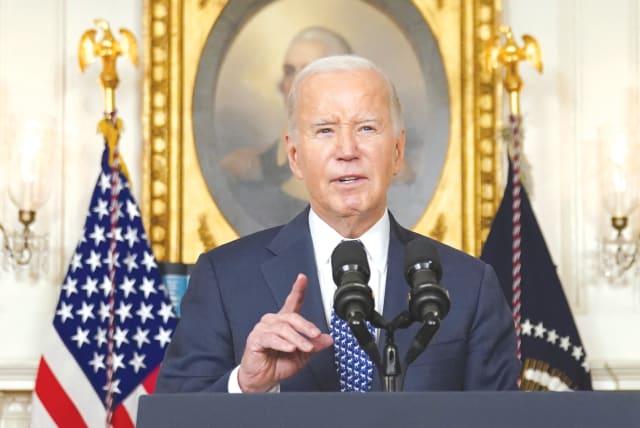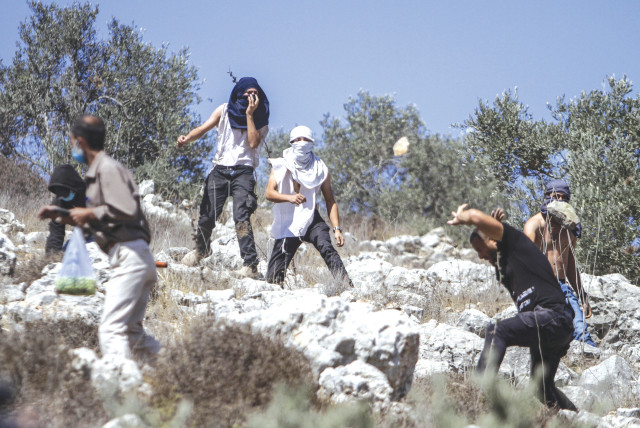Biden settler sanctions: Blood libel or better late than never? - comment

If Israel effectively addressed settler violence by arresting and prosecuting perpetrators, the United States probably would not have imposed sanctions.
Was the Biden administration’s sanctioning of four Israelis linked to violent attacks against Palestinian West Bank residents a potentially incendiary accusation or a justified cautionary measure for an area that some security officials have said is on the verge of a third intifada?
Earlier this month, US President Joe Biden issued an executive order that authorizes sanctions on individuals, whether private citizens or government officials, involved in or enabling violence against Palestinians or intimidation, prompting them to vacate their homes.
The sanctions, which were imposed on four Israelis who have been convicted, indicted, or suspected of perpetrating violent attacks against Palestinian residents in the West Bank, include freezing their US assets and banning their entry to the United States.
“I, Joseph R. Biden Jr., President of the United States of America, find that the situation in the West Bank – in particular high levels of extremist settler violence, forced displacement of people and villages, and property destruction – has reached intolerable levels and constitutes a serious threat to the peace, security, and stability of the West Bank and Gaza, Israel, and the broader Middle East region,” the executive order reads. “These actions undermine the foreign policy objectives of the United States, including the viability of a two-state solution and ensuring Israelis and Palestinians can attain equal measures of security, prosperity, and freedom. They also undermine the security of Israel and have the potential to lead to broader regional destabilization across the Middle East, threatening United States personnel and interests.”
The move likely happened because Washington was frustrated with Israel not addressing violence from settlers and feared the West Bank unrest caused by such actions. It probably occurred now because the president faces reelection and has gotten criticism from his voters for strongly supporting Israel after the Oct. 7 Hamas attack.
Settlers say they live in constant fear, but the US has long warned about West Bank violence
Some settlers feel the sanctions, coming only four months after Hamas infiltrated Israel and brutally slaughtered more than 1,200 citizens, is a “blood libel” and “detached from reality,” they told The Jerusalem Post. They mocked the president for focusing his attention on whether some young Israelis could put their money in the bank rather than on an international rise in extremism.
Moreover, settlers said they live in constant fear.
The IDF has seen a “significant rise in terrorist attacks” in the West Bank, including more than 700 attempted attacks by Palestinians against Israelis since Oct. 7, it recently told NPR.
Additionally, N12 reported that the IDF and the Shin Bet recently warned Prime Minister Benjamin Netanyahu that there could be a significant increase in violence in the West Bank.
“We might have another intifada in the West Bank,” said IDF commanders, citing Palestinian economic problems since the war began.
Israel has held back hundreds of millions of dollars in tax money that should go to the Palestinian Authority as part of its policy of deducting funds equivalent to what the PA pays in monthly stipends to terrorists and their families. Also, it has not let around 150,000 Palestinian workers go back to work in Israel and the settlements.
Residents of Jewish communities inside Israel but alongside the Green Line complained of hearing digging beneath their homes, alongside explosion sounds coming to them from the Tulkarm area.
In an interview with 103FM, Bat Hefer resident Gadi Ohayon said, “We live in a constant state of insecurity; the town is targeted with direct and indirect fire almost daily. We can show you pictures of shells from our yards.”
Ohayon said that the West Bank and Jewish communities on the border with it “are no less at risk” than those in the North and South.
“We need to understand that what they did on Oct. 7 is a model for what they plan to do,” Ohayon told 103FM. “Maybe it won’t happen in a minute, but we can’t be surprised. Once they cross the fence of Bat Hefer and the nearby cities of Kfar Saba, Ra’anana, Hadera, Netanya, the entire line will come under fire, up to the sea.”
A settler, Shai Coen, similarly told NPR that the risks of Palestinian violence are higher than ever, and the settlers need to be defended.
“We have terror attack[s]. A lot of terror attack[s],” he said.
Finally, a frequently cited Palestinian Center for Policy and Survey Research showed that the majority (72%) of Palestinians believe the Oct. 7 attack by Hamas on Israel was correct. Support for Hamas has more than tripled in the West Bank since the start of the war, according to the poll, with some 85% of West Bank respondents voicing satisfaction with the role of Hamas in the war.
A long-time resident of the West Bank, who has a gun license despite never owning a firearm, informed the Post that she recently decided to buy one.
The settlers’ concerns are valid, given the thousands of innocent lives lost to Palestinian terrorism within sovereign Israel and the West Bank, including the first and second intifadas and the upsurge in attacks since 2022. Separate from the more severe attacks involving bombs, guns, and knives, settlers face almost daily incidents of stone-throwing at vehicles on the roads.
On the other hand, Israeli violence is also morally wrong and exacerbates tensions in the region. It also delegitimizes settlers’ presence on the land, which they refer to today as Judea and Samaria, which was once part of their biblical heartland.
Unlike Palestinians, who are swiftly arrested or even killed by the IDF when attempting attacks on Israelis, settler vigilantes often evade punishment. This is evident in the case of the four extremists recently sanctioned by the United States. Despite numerous allegations of violence, they have faced minimal consequences and served negligible time for their actions.
David Chai Chasdai, a 29-year-old father of two residing in the West Bank outpost of Givat Ronen, has been repeatedly arrested, issued restraining orders, indicted, and convicted for various offenses. Most recently, he is suspected of involvement in the deadly settler rampage in Huwara last year, for which he has still not been formally charged for his alleged role in instigating the violence there.
Yinon Levi, founder of the illegal outpost Meitarim Farm in the South Hebron Hills, has faced repeated accusations of orchestrating physical assaults and harassment against nearby Palestinian communities. In one instance, he allegedly led settlers to the now-abandoned Palestinian village of Zanuta, where they assaulted residents, damaged property, and forced them to flee for safety. Despite complaints to the police and IDF, no action has been taken against him.
Einan Tanjil, 21, was among a group of about 20 Israelis who hurled rocks at Israeli activists and Palestinian olive harvesters in 2021, attacking them with wooden clubs. Tanjil, convicted through a plea bargain for assault and causing bodily harm, is awaiting sentencing.
Shalom Zicherman, 33, a resident of Mitzpe Yair, was caught on camera in 2022 and indicted on charges of causing injury, assault, and maliciously damaging a vehicle; his trial is currently in progress.
The government responded to Biden’s executive order by stressing that “the overwhelming majority of residents in Judea and Samaria are law-abiding citizens, many of whom are currently fighting as conscripts and reservists to defend Israel. Israel acts against all Israelis who break the law everywhere; therefore, exceptional measures are unnecessary.”
While it is true that the vast majority of Jews living in the West Bank are nonviolent, the government has shown that the police and the IDF are incapable of handling settler violence when it does happen.
The US has been complaining about this for a long time.
In March 2023, the State Department’s 2021 Country Reports on Terrorism accused Israel of failing to prevent attacks by settlers in the West Bank.
“Israeli security personnel often did not prevent settler attacks and rarely detained or charged perpetrators of settler violence,” the report stated, citing United Nations figures of nearly 500 incidents of settler violence in 2021, yet only one settler conviction.
The number of incidents spiked to closer to 850 in 2022 and was 1,225 in 2023, according to the UN Office for the Coordination of Humanitarian Affairs.
IDF sources have told the Post that Jewish violence against Palestinians was already unusually high in 2023 and even in 2022 compared to previous years.
If Israel effectively addressed settler violence by arresting and prosecuting perpetrators, the United States probably would not have imposed sanctions.
While it’s uncertain how much impact the sanctions will have beyond the four settlers, they should signal a warning to Israel to protect both Jewish and Palestinian residents in the West Bank.
The writer is deputy CEO – strategy and innovation for The Jerusalem Post and a senior correspondent. She also co-hosts the Inside Israeli Innovation podcast.
Jerusalem Post Store
`; document.getElementById("linkPremium").innerHTML = cont; var divWithLink = document.getElementById("premium-link"); if (divWithLink !== null && divWithLink !== 'undefined') { divWithLink.style.border = "solid 1px #cb0f3e"; divWithLink.style.textAlign = "center"; divWithLink.style.marginBottom = "15px"; divWithLink.style.marginTop = "15px"; divWithLink.style.width = "100%"; divWithLink.style.backgroundColor = "#122952"; divWithLink.style.color = "#ffffff"; divWithLink.style.lineHeight = "1.5"; } } (function (v, i) { });

